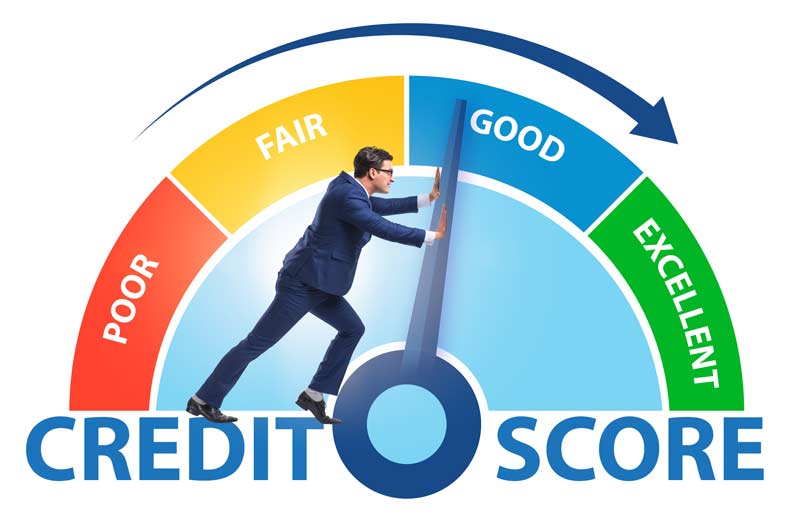When you have a low or bad credit score it may become difficult to get a mortgage, a credit card or a loan. It may also subject you to higher interest rates, this may make it difficult to repay loans and credit lines. If your CIBIL score is poor you might be wondering how to improve your credit score? Having a bad credit score doesn’t last forever.
There are various ways in which you can improve and increase your free credit score.
- Pay off outstanding payments
Your payment history is an important element in determining your credit score as it makes up to 30% of your credit rating. Your credit score suffers the more behind you are on your payments.
Pay off any outstanding balances on your cards before they’re charged off or turned over to a collections agency.
Make every effort to settle any outstanding sums in full so that the lender can upgrade the account status to “paid in full,” which will show better on your credit than an unpaid account. Additionally, you will continue to pay finance costs if you have a balance while you gradually pay off an account over time.
- Get your credit report
It’s important to know your current credit score and your best credit score till date. Knowing your starting point is necessary before you can determine how to raise your credit score. Your credit report should be your first stop if you want to raise your credit score because it contains the data that forms the basis of your credit score.
Your debt, repayment history, and credit card history, credit management are all included in your credit report. It might also include details about any bankruptcies, repossessions, or accounts that have been turned over.
- Don’t apply for new credit card
Avoid submitting any new credit applications while you’re trying to repair your credit. The lender will frequently conduct a “hard inquiry” when you apply for new credit, which is a credit check that appears on your credit report and affects your credit score.
Your risk as a borrower is reflected in how many new credit accounts you have opened recently and how many hard inquiries you have had, which together account for 10 to 12% of your credit score. Opening a lot of accounts in a short amount of time may signal to lenders that a borrower is in serious financial trouble, which could further harm your score. A low number of freshly opened accounts, or none at all, suggests financial stability.
- Correct the errors and dispute
You must promptly dispute any mistakes by going to the official website www.CIBIL.com. After reviewing your CIBIL report, you can decide which transaction is incorrect or with which you disagree. Within 30 days, you must respond to the disagreements and make the necessary corrections are made.
Your credit score can be negatively impacted by errors, which can result from data entry mistakes made by creditors, easily mistaken Social Security numbers, birthdays, or addresses, or identity theft.
- Don’t apply repeatedly if rejected
Your credit report will contain information on any loan or credit card applications you have made and were denied. If you immediately apply to another bank, they may reject your application if they see your low score and the previous rejection. The best course of action in these situations is to refrain from applying again and wait for the score to rise.
- Leave your accounts open
It is uncommon for closing a credit card to raise your credit score. Make sure that closing an account won’t harm your credit at the very least before doing so. You might be tempted to cancel credit card accounts that are overdue but the balance will remain on your credit record until it is paid in full. It is advisable to keep the account open and make on-time payments each month to reduce the balance.
Since credit history duration accounts for your credit score, cancelling a card with no debt can still lower your score. Your oldest account and most current account ages, as well as the average age of your credit history, are taken into consideration.
- Avoid joint applicants
In fact, even if you are not at fault, you could nevertheless suffer as a result of having a joint applicant. In this case, if you were a joint applicant for a loan that someone else had taken and they had failed on payments, it would have an adverse effect on both of your credit scores. Making sure that the loans and credit cards are being paid off on time is the greatest approach to prevent this.
While it is true that a low credit score can hurt your ability to get future credit, there are still certain things that can be done to improve the issue. The only thing you must remember is that it takes at least a few months for the scores to rise, so be prepared to wait a while before your scores begin to rise.
- Patience is Key
While patience isn’t a factor in the calculation of your credit score, it is a quality you’ll need while working to restore your credit. Don’t anticipate your credit to improve in that period because it wasn’t overnight. Over time, your credit score will increase if you keep an eye on it, control your spending, and make your monthly debt payments on schedule.




